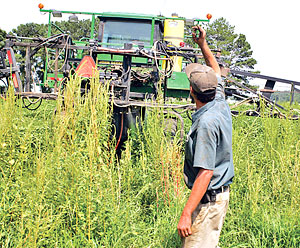Corn gone, so farmers turning to other crops
By Anessa Myers
Published in News on August 22, 2008 1:37 PM
Dry conditions have devastated Wayne County's corn crop for the second year in a row and farm observers say there might well be fewer acres of corn planted next year.

News-Argus/Bobby Williams
Mel Anderson guides a sprayer in a soybean field west of Mount Olive on Wednesday as Edvardo Lopez steers the machine. Many Wayne County farmers are busy spraying to kill worms in the crop. Anderson and Lopez are employees of the Major Jones farming operation. With the local corn crop pretty much dead in the field, farmers are turning their attention to their soybean, cotton and tobacco.
Wayne farmers planted about 35,000 acres of corn this year, slightly less than last year, Extension agent Kevin Johnson said. And with most growers expecting to make little, if anything, off the harvest, he said he expects the acreage devoted to corn to continue to dwindle.
"We have had two drought years in a row, and I think the farmers are done trying to crop a lot of corn," Johnson said.
Corn needs water more than most any other crop grown in the state. And it needs it, especially during the crucial tasseling stage, when the plant makes its ears. Johnson added that the intense heat that struck the county also contributed to the poor showing.
"I would say that we lost 75 percent of our corn this year," Johnson said.
With the price of corn near an all-time high, many farmers were counting on the prices to turn a good profit but will come away disappointed.
"We were banking on a bumper crop at a bumper price. Now we are just trying to do our best and make a living," said Brad West, who planted more than 1,000 acres on his farm near Fremont.
"I'm hoping we can at least get some picked," West said. "There is some that is OK, some below average and some that is terrible."
In a good year, West said, he would make 150 bushels of corn per acre. This year, he said he will be lucky if he gets 50 or 60 bushels.
"I really believe the week of 100-degree temperatures early on hurt more than the lack of rain. We got some rain where it could have been OK, but it had been nearly fried by then," West said.
Other crops are faring somewhat better.
Cotton, soybeans and tobacco can withstand dry weather better than corn, and Johnson said farmers are still holding out hope that they will make a decent crop.
Harrell Overman is another Wayne farmer who has pretty much given up hope for his corn. Overman said he planted 1,600 acres of corn this year and about the same in both wheat and soybeans. Wayne farmers had a bumper crop of wheat harvested in early summer and soybeans are looking fair at this point, he said.
"It's not good," he said, describing the corn crop. "It's a disaster. We're going to pick it, but it's bad. It's making less than a third of the crop. In some cases, it's not making any at all."
But soybeans "look a lot better since the last rain," he said.
Johnson pointed out that there is a bigger window of opportunity for soybeans to succeed. The profit margin is less than that for corn, but it represents a safer bet. Still, some farmers had to replant their soybean crops three times before they got enough plants to come up, and even then, some lost as much as 30 percent of the crop, he said.
"You can't make as much money with soybeans as you can corn, but there is also more risk with corn," he said.
West said his soybeans are looking pretty good, too, along with his peanuts.
"If we can pull one more rain this week, we will be good," he said.
As for tobacco, Johnson says it's a tough crop, one that -- like cotton -- doesn't mind the heat and dry conditions as much.
"Tobacco looks fairly good," he said. "The dry weather created stress which has caused some disease, but it's a decent year for tobacco."
Cotton also appears to be faring well, he added.
West said his tobacco crop will be better than his corn.
"It's a heavy crop this year, short, but pretty good poundage," he said.
The problem with tobacco is that is has been slow in developing, leaving many farmers with a lot of leaves still in the field waiting to be harvested.
Adding to the problems posed by the weather has been the cost of fertilizer and fuel, which has pinched farmers especially hard this year.
The cost of fertilizer skyrocketed and could be even higher next year, the farmers said, further cutting into their profit margin.
Speculation of next year's cost of liquid nitrogen -- a staple for corn -- can only be termed "ridiculous," West said.
